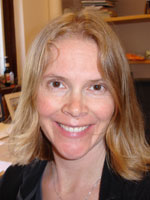 |

For further information, contact the MBL Communications Office at (508) 289-7423 or e-mail us at comm@mbl.edu
For Immediate Release: September 15, 2010
Contact: Gina Hebert, 508-289-7725; ghebert@mbl.edu
MBL Scientist Julie Huber Receives Career Development Award
Award Established by Molly N. Cornell and her late husband Neal W. Cornell
 |
 |
Josephine Bay Paul Center assistant scientist Julie Huber. Larger image.
|
|
WOODS HOLE, MA—Dr. Julie Huber, an assistant scientist in the Josephine Bay Paul Center for Comparative Molecular Biology and Evolution at the MBL (Marine Biological Laboratory), has been awarded the Neal Cornell Career Development Award.
The three-year award, the result of the generous support provided by the Neal W. Cornell Endowed Research Fund and the MBL Research Development Fund, was established “to enhance research at the MBL by providing support and encouragement to scientists who are in the early stages of their research careers.”
The Neal W. Cornell Endowed Research Fund was established in memory of the late Neal W. Cornell, a biochemist who was a senior scientist at the MBL from 1988 until his death in 2000. Prior to conducting year-round research at the MBL, Dr. Cornell was a summer investigator and visiting scientist for many years. His research focused on the biochemical aspects of cell structure and function, the regulation of central metabolic pathways, and the molecular aspects of growth and development.
During his life, Dr. Cornell and his wife, Molly N. Cornell, established the MBL Research Development Fund to support year-round research at the MBL. Both of the Cornell funds contributed to Dr. Huber’s award.
Dr. Huber is a microbial oceanographer who joined the staff of the Bay Paul Center in 2007. Her research investigates microbial communities at deep-sea hydrothermal vents and within the subseafloor, a largely undiscovered environment that represents a unique and ubiquitous habitat on Earth. As part of the Brown-MBL Graduate Program in Biological and Environmental Sciences, Dr. Huber is an assistant professor in the Department of Ecology and Evolutionary Biology at Brown University.
Dr. Huber has logged almost a year at sea exploring the deep ocean. Due to the challenges of understanding this habitat, she employs a combination of molecular, cultivation, and geochemical approaches to understand the microbial populations and their local adaptations to the crustal environment.
“Since her appointment just over two years ago, Julie Huber has become a poster child for how to excel as a young investigator at the MBL,” said Bay Paul Center director Mitchell Sogin. “She oversees a multidisciplinary research program that enjoys broad based funding and has produced results that have impressed the international world of microbial oceanography.”
“I am very honored to receive the Cornell Award, said Dr. Huber. “The ability to conduct cutting-edge and high-risk research in deep-sea microbiology that might not otherwise be supported by traditional funding agencies is a wonderful opportunity for both me and the young scientists working in my lab.”
Dr. Huber received a Ph.D. in oceanography from the University of Washington in 2004 and an undergraduate degree at Eckerd College, where she graduated with a perfect 4.0 GPA. She has been awarded a National Research Council Research Associateship, a National Science Foundation Graduate Research Fellowship, and was a Ford Foundation and NASA Scholar. In 2007, Dr. Huber received a highly selective L’Oréal USA Fellowship which recognizes up-and-coming female scientists who are conducting innovative and groundbreaking research in the life and physical/material sciences, as well as mathematics, engineering and computer science.
The MBL® is a leading international, independent, nonprofit institution dedicated to discovery and to improving the human condition through creative research and education in the biological, biomedical and environmental sciences. Founded in 1888 as the Marine Biological Laboratory, the MBL is the oldest private marine laboratory in the Americas.
|